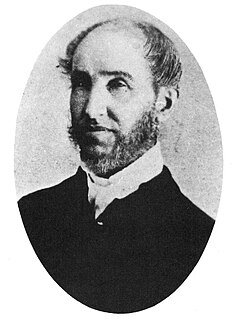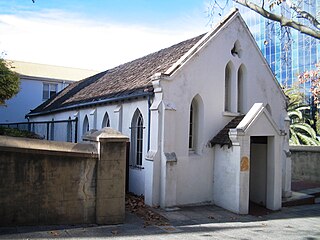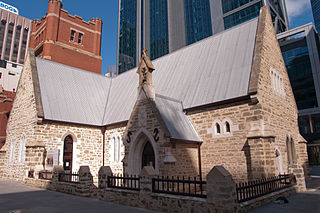
The City of Swan is a local government area of Western Australia. It is in the eastern metropolitan region of Perth and includes the Swan Valley and 42 suburbs. It is centred approximately 20 km north-east of the Perth central business district. The City covers an area of 1,042 km² and had an estimated population of 155,653 in 2020.

The Cathedral Church and Minor Basilica of the Immaculate Mother of God, Help of Christians is the cathedral church of the Roman Catholic Archdiocese of Sydney and the seat of the Archbishop of Sydney, currently Anthony Fisher OP. It should not be confused with the nearby, later, Anglican St Andrew's Cathedral. It is dedicated to the "Immaculate Mother of God, Help of Christians", Patroness of Australia and holds the title and dignity of a minor basilica, bestowed upon it by Pope Pius XI on 4 August 1932.

Guildford Grammar School, informally known as Guildford Grammar, Guildford or GGS, is an independent Anglican coeducational primary and secondary day and boarding school, located in Guildford, a suburb of Perth, Western Australia.

Guildford is a suburb of Perth, Western Australia, 12 km northeast of the city centre. Its local government area is the City of Swan.

Parliament House, Perth is located on Harvest Terrace in West Perth, Western Australia. It is the home of the Parliament of Western Australia, including the Legislative Council and Legislative Assembly.

William Mitchell was a Church of England priest who was the second ordained person, after The Rev Louis Giustiniani to provide religious services in the Swan Valley area of the Swan River Colony. He worked in the Swan Parish for over 20 years before moving to Perth to take up a position working with convicts and prisoners in the Perth Gaol in Beaufort Street.

St Mary's Cathedral, Perth, officially the Cathedral of the Immaculate Conception of the Blessed Virgin Mary, is the cathedral church of the Roman Catholic Archdiocese of Perth, and seat of its Archbishop, currently Timothy Costelloe.
Australian non-residential architectural styles are a set of Australian architectural styles that apply to buildings used for purposes other than residence and have been around only since the first colonial government buildings of early European settlement of Australia in 1788.

Reverend Canon Percy Umfreville Henn was a clergyman and teacher in England and later Western Australia. He is best known for his time as Headmaster at Guildford Grammar School and later for the building of the Chapel of SS. Mary and George.

Federation architecture is the architectural style in Australia that was prevalent from around 1890 to 1915. The name refers to the Federation of Australia on 1 January 1901, when the Australian colonies collectively became the Commonwealth of Australia.

St John's Pro-Cathedral is located at 18 Victoria Avenue in Perth, Western Australia. It is the earliest Roman Catholic church building in Western Australia.

The Old Perth Boys School, located at 139 St Georges Terrace, Perth, Western Australia, is the earliest government school building in Western Australia. The single-storey limestone building was designed by William Ayshford Sanford in 1852 and is a significant example of a colonial building constructed in Perth from the mid-nineteenth century.

Wesley Church is a Uniting Church in Perth, Western Australia, located at the corner of William Street and Hay Street. It is one of the oldest church buildings and one of few remaining 19th-century colonial buildings in the City of Perth.

St Mary Star of the Sea is a historically significant Catholic parish church in West Melbourne, Victoria, Australia. The foundation stone of the church was laid in 1882 and the building was completed by 1900. Since 2002, restoration has been ongoing to restore the church to its original state. Built with seating for over 1,200 people, it has been described as the largest parish church in Melbourne, in Victoria, or even in Australia.

St Brigid's Church is a heritage-listed Roman Catholic church in Northbridge, Western Australia. The church precinct comprises the church building itself, a convent, a presbytery and a school, situated on a block of land bounded by Aberdeen Street, Fitzgerald Street, John Street and a park and freeway exits.

St Matthew's Church is an Anglican church in Guildford, Western Australia. The church is part of the Anglican Diocese of Perth.

Trinity Church is one of the oldest church buildings in the City of Perth, and one of the few remaining 19th-century colonial buildings in the city. It is located at 72 St Georges Terrace in Perth, Western Australia.

St Mary's Catholic Church is a heritage-listed Roman Catholic church at 20 Merivale Street, South Brisbane, Queensland, Australia. It was designed by Simkin & Ibler and built from 1892 to 1929. It was added to the Queensland Heritage Register on 3 December 2004.

Padbury Buildings is the name for a range of existing and former structures found in various localities in Western Australia. The Padbury family, mainly Walter Padbury, had a range of buildings, some of which now are heritage listed.

Saints Mary and Joseph Catholic Cathedral is a heritage-listed cathedral at 132 Dangar Street, Armidale, Armidale Regional Council, New South Wales, Australia. It is the diocesan cathedral of the Roman Catholic Diocese of Armidale and the seat of the Catholic Bishop of Armidale. The cathedral was designed by John Hennessy of Sheerin and Hennessy, and built from 1911 to 1912 by George Frederick Nott. It is also known as the St Mary & St Joseph Catholic Cathedral and the Cathedral of Saint Mary and Saint Joseph. It was added to the New South Wales State Heritage Register on 13 February 2015.





















